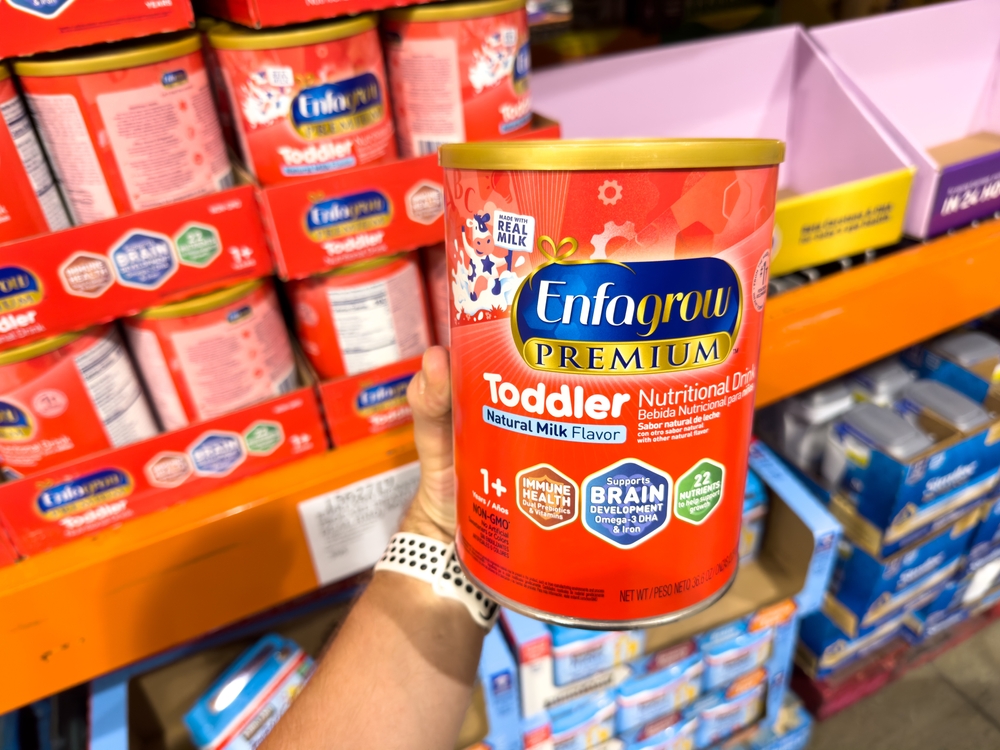New clinical guidance released by the American Academy of Pediatrics (AAP) cautions parents that formulas marketed as healthy and nutritious for toddlers are unnecessary and provide little to no health benefits.
These “toddler milks” and other beverages are offered as transition drinks designed to wean children between 12-36 months off breast milk or baby formula.
Toddler milk does contain enhanced Vitamin E and D levels compared to unfortified cow’s milk, but virtually all milk sold in the U.S. is fortified. Therefore, the AAP says toddlers who can consume solid foods have no nutritional need for these beverages.
The drinks can be a helpful alternative for some children who cannot consume milk or have specialized medical needs, said Steven A. Abrams, co-author of the report and a past member of the AAP’s Committee on Nutrition. But they should only be consumed under a pediatrician’s guidance and supplemented with nutritionally complete drinks.
A previous 2019 report also noted that for healthy toddlers, these products offer no nutritional value above that found in solid food and often contain high sodium levels and added sugars.
In addition to giving toddlers a sweet tooth that can last a lifetime, researchers have found that formula with corn syrup solids increases the risk of early obesity and fatty liver disease. It is also much more expensive than cow’s milk. According to the USDA, toddler formula can cost more than $40 for a 30-ounce can compared to $4.33 for a 128-ounce (one gallon) of milk.
The AAP report echoed pediatricians’ concerns about increasing “questionable marketing practices.” Misleading packaging tricks parents into thinking that toddler drinks, which surfaced in the mid-1990s, are a good choice for their children.
According to a Washington Post article, in 2015, toddler milk manufacturers spent $17 million on advertising, compared to less than $10 million on infant formula.
Toddler drinks are also often located with nutritionally-proven baby formula on store shelves, using similar packaging that boasts improved “immune function” or “brain development.” Notably, these claims are not required to be based on science or FDA approval.
While infant formula nutritional and safety standards are strictly regulated under the 1980 Infant Formula Act, toddler milk guidelines are much less stringent because children over 12 months are not wholly dependent on milk or formulas for nutrition.
Infant Formula NEC Cases
Some toddler drinks are manufactured by infant care household names, including Enfamil and Similac. Both companies have been under fire in recent years for false claims that their other major product, baby formula, is safe and effective.
NEC baby formula lawsuits are being filed against Enfamil and Similac after discovering that certain cow’s milk-based baby formula made specifically for premature infants doubles their risk of developing necrotizing enterocolitis (NEC).
NEC is a devastating condition that attacks the baby’s intestines, causing a bacterial invasion that allows waste to leak directly into the stomach. It can be fatal if not treated quickly.
Premature babies, or preemies, are born with underdeveloped lungs and intestines, making it harder for their bodies to carry blood and oxygen around. This makes them more susceptible to infection. Cow’s milk formula is harder to digest than breast milk, but many preemies are too weak to latch onto their mothers for breastfeeding and are given formula in the neonatal intensive care unit (NICU).
Parents began filing lawsuits against Similac and Enfamil when their preemies consumed formula and developed NEC shortly after; many succumbed to the disease just days or weeks after birth.
These claims allege that the formula manufacturers knew the risk of NEC and marketed them as safe for preemies anyway.
Anyone with a preemie or infant who develops NEC after drinking manufactured baby formula should consult an experienced NEC baby formula attorney to explore the benefits of filing an NEC baby formula lawsuit. Many of the lawsuits have been consolidated into multidistrict litigation to expedite the process, and parents can join these existing actions or file on their own. They can recover possible compensation such as medical bills, pain and suffering, and lost wages.




